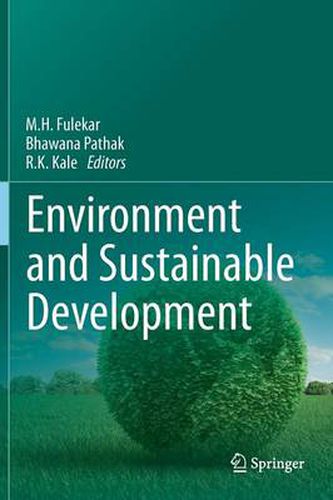Readings Newsletter
Become a Readings Member to make your shopping experience even easier.
Sign in or sign up for free!
You’re not far away from qualifying for FREE standard shipping within Australia
You’ve qualified for FREE standard shipping within Australia
The cart is loading…






This title is printed to order. This book may have been self-published. If so, we cannot guarantee the quality of the content. In the main most books will have gone through the editing process however some may not. We therefore suggest that you be aware of this before ordering this book. If in doubt check either the author or publisher’s details as we are unable to accept any returns unless they are faulty. Please contact us if you have any questions.
Global society in the 21st century is facing challenges of improving the quality of air, water, soil and the environment and maintaining the ecological balance. Environmental pollution, thus, has become a major global concern. The modern growth of industrialization, urbanization, modern agricultural development and energy generation has resulted in the indiscriminate exploitation of natural resources for fulfilling human desires and needs, which has contributed in disturbing the ecological balance on which the quality of our environment depends.
Human beings, in the truest sense, are the product of their environment. The man-environment relationship indicates that pollution and deterioration of the environment have a social origin. The modern technological advancements in chemical processes/operations have generated new products, resulting in new pollutants in such abundant levels that they are above the self-cleaning capacity of the environment. One of the major issues in recent times is the threat tohuman lives due to the progressive deterioration of the environment from various sources. The impact of the pollutants on the environment will be significant when the accumulated pollutants load will exceed the carrying capacity of the receiving environment.
Sustainable development envisages the use of natural resources, such as forests, land, water and fisheries, in a sustainable manner without causing changes in our natural world. The Rio de Janeiro-Earth Summit, held in Brazil in 1992, focused on sustainable development to encourage respect and concern for the use of natural resources in a sustainable manner for the protection of the environment.
This book will be beneficial as a source of educational material to post-graduate research scholars, teachers and industrial personnel for maintaining the balance in the use of natural sources for sustainable development.
$9.00 standard shipping within Australia
FREE standard shipping within Australia for orders over $100.00
Express & International shipping calculated at checkout
This title is printed to order. This book may have been self-published. If so, we cannot guarantee the quality of the content. In the main most books will have gone through the editing process however some may not. We therefore suggest that you be aware of this before ordering this book. If in doubt check either the author or publisher’s details as we are unable to accept any returns unless they are faulty. Please contact us if you have any questions.
Global society in the 21st century is facing challenges of improving the quality of air, water, soil and the environment and maintaining the ecological balance. Environmental pollution, thus, has become a major global concern. The modern growth of industrialization, urbanization, modern agricultural development and energy generation has resulted in the indiscriminate exploitation of natural resources for fulfilling human desires and needs, which has contributed in disturbing the ecological balance on which the quality of our environment depends.
Human beings, in the truest sense, are the product of their environment. The man-environment relationship indicates that pollution and deterioration of the environment have a social origin. The modern technological advancements in chemical processes/operations have generated new products, resulting in new pollutants in such abundant levels that they are above the self-cleaning capacity of the environment. One of the major issues in recent times is the threat tohuman lives due to the progressive deterioration of the environment from various sources. The impact of the pollutants on the environment will be significant when the accumulated pollutants load will exceed the carrying capacity of the receiving environment.
Sustainable development envisages the use of natural resources, such as forests, land, water and fisheries, in a sustainable manner without causing changes in our natural world. The Rio de Janeiro-Earth Summit, held in Brazil in 1992, focused on sustainable development to encourage respect and concern for the use of natural resources in a sustainable manner for the protection of the environment.
This book will be beneficial as a source of educational material to post-graduate research scholars, teachers and industrial personnel for maintaining the balance in the use of natural sources for sustainable development.